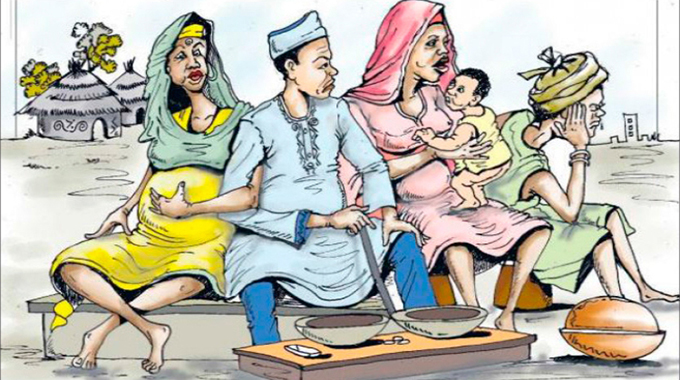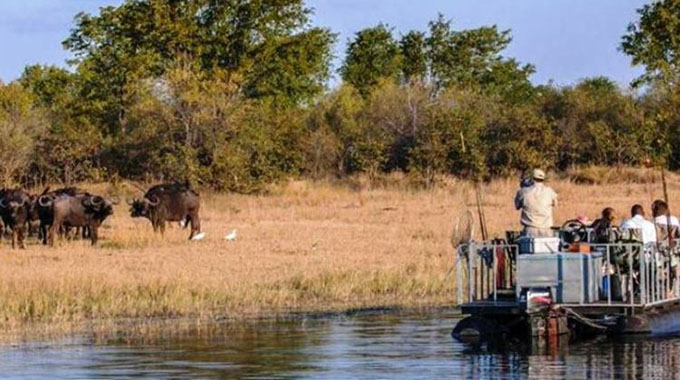The sacred shrine and its power
Reflections Isdore Guvamombe
Back in the village, in the land of milk, honey and dust or Guruve, the time between the harvest period and the time to go back to the next planting season is normally the time to socialise, given that there is no pressure of work. This time, even livestock freelance.
This time beer drinking binges are abound and this time boys and girls have enough time for courtship. For the boys and girls the river, the borehole or the well are the meeting places. Moonlight gigs are another place and especially at the moonlight gigs or jiti, many care-free virgins are deflowered.
This particular time in August 2013, an ill spectacle had hit the Masoka Village.
A very influential oracle, the medium of the spirit of Nyamasoka, had departed to the world yonder. It was announced among the elders, who quietly passed on the message. The village mood changed.
Young girls, boys, men and women were not told but they suspected. Only women past their mendicancy were allowed into the sacred shrine or Dendemaro, where funeral rights were performed.
The oldest woman in the village, Mbuya Kuipakunoyamura, had made quick brew for the occasion.
The young, still milking from behind their ears, could see something was amiss but they could not tell what it was.
That all night gigs were cancelled, through proclamation by the main officiator, the spirit medium Chimhawu. A funeral silence hung over the village. Even the ever-green foliage of the huge trees dotting the village remained motionless. The footpaths criss-crossing the grass thatched stockade huts lay dark and deserted.
No life stirred!
The night before, the leafy branches had danced and swayed as they were caressed by the gentle breeze and the footpaths had been awash with boys and girls going to different gigs were cross rhythms of the African drum called them. Today, it was taboo to gig. On such occasions the spirit medium uses his cats, the lions, to eat who ever broke ranks with the proclamation.
The following day most villagers retreated to their homes, save for a few chosen ones, who lay guarding the body. Two men, the mediums of Chimhawu and Goredema clad in all black regalia left the village for the river side, for a secret conservation with the spirits long gone.
A strong breeze blowing across the river Hangwa, (misspelt Angwa by the Europeans) sent ripples on the water surface as they stood by the river bank with their backs on the afternoon sun. Their wobbling shadows lay long, lean and formless on the water in the sacred pool in front of them.
Suddenly they stood still and silent, each one’s thoughts trying to penetrate the fog surrounding the future of the village. Slowly but imperceptibly, their shadows became hazy and finally disappeared, leaving in front of them only the muddy waters of Hangwa flowing relentlessly on its certain course. A small silhouette sunset cloud blotted out the sun and its light. The two men returned to the village shrine for the night ritual.
Inside the sacred shrine, men sat on reed mats on one side, while women sat on the other side, their legs stretched before them and exposing the cracks under their feet. No one minded the cracks. It was normal to be known by your foot cracks imprinted on the ground on your spoor, for a community where shoes are a luxury. The foot cracks were a trademark and some form of identity. You would easily know who has gone to the river, by merely looking at the spoor. Yes, the spoor.
The spoor!
As the night wore on, the drum grew louder and louder, the singing blending melodiously with the sacredness of the event. Suddenly the medium of Chimhawu went into a trance. A high pitched voice called everyone to order. The spirit spoke softly but in measured tones, amid clapping and ululating. The voice was male, deep and vibrant.
“Our elders say if the cockroach wants to rule over the chicken, then it must hire the fox as a body-guard. Do you hear me?”
The villagers answered in unison, clapping in respect.
“I said without a leader, black ants are confused. Are we not confused, now that our spiritual leader is gone? Does anyone disagree with me?”
Everyone answered “No!” but clapping, still. No one looked the medium straight in the face. They all cast their eyes downwards.
When the spirit possessed, this villager, saw the medium’s eyes narrow into slits, his nose dilate and the once mobile and cheerful face this villager had dealt with the previous day, contorting and turning into a hideous mask. This villager was stunned.
The spirit was thirsty and an elderly woman went on her knees with a calabash on her head. Slowly, carefully and tentatively she placed the calabash in front of the medium. Men clapped, women ululated.
The calabash was full of village wine, an alcoholic ceremonial drink brewed from fermenting maize meal and wild fruit (masau). Still in a trance, the medium bended slightly forward, took the calabash and tipped it, pouring some on the ground as a libation, an offering of drink to God and the ancestors and a prayer for the community. There was clapping. Silence! Rhythmic clapping . . . clapping and clapping. Silence! Ululating, silence . . . silence and ululation.
When he had finished the praying, he tipped the calabash over, pouring the rest of the wine on the ground. Ululation, rhythmic clapping, ululation and clapping. Silence, silence, silence! Silence.
There was singing all night long and the medium danced until the wee hours of the night, the time elephants normally bath, when he gave his parting note. He directed that the deceased be buried in the prohibited Chiwore National Parks and assured the crowd that National Parks and Wildlife Management Authority, that normally strictly deny entrance into the park, would have sense knocked into their heads by the spirits and will not deny the burial in the wildlife infested park.
At day break, it was a miracle how parks rangers at Mukanga Camp allowed the villagers, for the first time in decades to carry the body 10 km into the park and bury according to tradition. The logic was that before the parks was proclaimed in 1975, the community used to stay there and had chosen that particular place as the shrine of their fallen mediums.
Ten km into the park, a huge grave, the size of a hut was dug. Inside it, a rake like the one village women keep their plates when washing them outside the hut, was built. There the body was placed, wrapped only in a piece of white cloth. No coffin.
Below the rake was a another dug out tunnel, there when the body eventually decomposed and the maggots would drop into it and fail to climb out until they died, also.
Eight weeks later, villagers with cotton tuft hair made a beeline to the shrine for the final burial. The body had decomposed. The maggots had also died. They removed from the decomposed body, the nails, the teeth and the hair and put them in a gourd. They took the gourd back to the village and the main official placed it in the village shrine or Dendemaro alongside the gourds of other foregone members of the ancestral lineage. When the next person is possessed by the spirit, his main test is to identify which gourd possesses, the nails, the teeth and the hair of the preceding medium. This process is called authenticating the spirit or kubata masuwo. It is a must test, done in full view of village elders.
Back in the village, in the land of milk, honey and dust, chancers are readily unmasked.






Comments